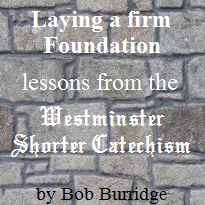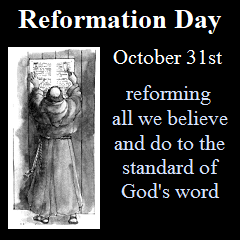God’s Word as a Means of Grace
by Bob Burridge ©2011
(watch the video)
(Westminster Shorter Catechism Questions 89-90)
God has communicated with us by giving us a Bible. One way he has promised to administer his grace to us is though our use of that special collection of books.

 The Apostle Paul reminded Timothy about the importance of knowing what God says to us in those books. In 2 Timothy 3:15-17 he wrote, “and that from childhood you have known the Holy Scriptures, which are able to make you wise for salvation through faith which is in Christ Jesus. All Scripture is given by inspiration of God, and is profitable for doctrine, for reproof, for correction, for instruction in righteousness, that the man of God may be complete, thoroughly equipped for every good work.”
The Apostle Paul reminded Timothy about the importance of knowing what God says to us in those books. In 2 Timothy 3:15-17 he wrote, “and that from childhood you have known the Holy Scriptures, which are able to make you wise for salvation through faith which is in Christ Jesus. All Scripture is given by inspiration of God, and is profitable for doctrine, for reproof, for correction, for instruction in righteousness, that the man of God may be complete, thoroughly equipped for every good work.”
This means that the wisdom we find in the Bible, God’s own word, is profitable for us because it teaches us what is true, it reproves us when we do things that are wrong, it corrects us about what we should believe and practice, and it trains us in how to live so that we please the God who made and saved us.
Psalm 19:7-8 is very similar when it explains the great value of God’s word, “The law of the LORD is perfect, converting the soul; The testimony of the LORD is sure, making wise the simple; The statutes of the LORD are right, rejoicing the heart; The commandment of the LORD is pure, enlightening the eyes;”
2 Peter 1:19 warns us not to ignore God’s prophetic word in the Scriptures. Peter had seen the Lord in all his glory with his own eyes, yet he wrote concerning that written word, “… we have the prophetic word confirmed, which you do well to heed as a light that shines in a dark place, until the day dawns and the morning star rises in your hearts;”
Westminster Shorter Catechism question 89 asks, “How is the Word made effectual to salvation?” It answers, “The Spirit of God maketh the reading, but especially the preaching, of the Word, an effectual means of convincing and converting sinners, and of building them up in holiness and comfort, through faith, unto salvation.”
We need to read God’s word.
Bibles have never been as available to us in the way they are today. In God’s providence we can read them in our own language, and have them with us all the time. Printed copies come in almost every form and size. They range from the ones in the dollar stores to the expensive leather-bound editions. We can even load them onto our computers, tablets, and smart phones. No era of history has had this kind of access to God’s written word.
There are many good translations of the Bible available too. Some are better than others, because they are more faithful to the original text. Some of the versions people read with great confidence are the King James, the New King James, English Standard, New International, and the New American Standard. These are translated by people who respect the Bible as God’s word, therefore they avoided changing the wording to make it fit better with their own ideas.
Having God’s word, and using it effectively are two very different things. Almost anything we need to do is best accomplished if we have a workable plan, and stay with it. The Bible is a big book filled with a lot of information. A hap-hazard approach where we dabble in Scripture now and then is of limited value.
We each have 24 hours of every day to budget so that we keep our priorities straight. We need to schedule our reading and studying of God’s word as carefully as we do the other things that demand our time. What we do with our time reveals what we really think is important. If we regularly read the sports or comics pages, or keep up with the news, hunt for coupons, and watch movies or regular TV shows, but we have no regular times to study our Bibles, something is seriously wrong.
There are many ways to go about daily Bible study. It can be as simple as just reading it through thoughtfully. One good plan is to read one chapter of the Old Testament, a Psalm, and one chapter of the New Testament each day. A chapter is usually shorter than most articles in a daily newspaper. There are several good reading plans available which have been organized by Pastors and Bible Teachers. Your church officers will probably be able to direct you to a plan they recommend.
Some keep a journal of God’s promises, or of lessons they learn in their reading. Some make outlines of the Bible books as they study. They could be detailed outlines, or just brief summaries of paragraphs or chapters. Others use simple underlining or highlighting methods and make notes in the margins. There is nothing wrong with making notes in the margins of your Bibles. Most of the earliest discovered copies of God’s word have marginal notations in them.
I like to read entire books of the Bible all the way through as I would read a good novel. That is the best way to get the flow of the author’s thoughts. A good goal is to read through all the books of the Bible every year.
Psalm 1 begins with a contrasts between the blessed man and those who are ungodly. It says in verses one and two, “Blessed is the man Who walks not in the counsel of the ungodly, Nor stands in the path of sinners, Nor sits in the seat of the scornful; But his delight is in the law of the LORD, And in His law he meditates day and night.”
Another good practice is to memorize verses that summarize God’s teachings. Psalm 119:11 “Your word I have hidden in my heart, That I might not sin against You.”
It is also very important that families read the Bible together, every day when possible. In our home we always ended our evening meal with the reading of a portion of the Scriptures, and a time of prayer.
God has given us a mandate: every believer should be daily, and responsibly learning God’s word. The Berean believers were commended as good examples for us to follow. In Acts 17:11 it says of them, “These were more fair-minded than those in Thessalonica, in that they received the word with all readiness, and searched the Scriptures daily to find out whether these things were so.”
What if a father came home from being off at war defending his family’s lives and freedom, and he had written letters home to encourage them and remind them of his love. What if when he returned he found that his wife and children had never read his letters? Maybe they read a sentence or two here and there, but never really read one all the way through? They explained that they meant to read them but they were too busy and never got around to it. How tragic that would be. Yet are we guilty of the same thing regarding God’s word to us in the Bible?
God our Father has told us what we ought to know. What he put in his letters to us must be important, or it would not be there. If we are only familiar with a few favorite portions of the Bible, we live as if God gave us a lot of unimportant material we can safely ignore.
We should attend to God’s word preached.
We should listen attentively to the teaching of God’s word every Sunday as we gather for worship on the Lord’s Day. This is the primary way God tells us to hear and to learn his word. In 1 Corinthians 1:21 the Apostle Paul wrote, “… it pleased God through the foolishness of the message preached to save those who believe.”
In Jeremiah 3:15 God attached his blessing to the work of pastors in teaching his word, It says, “And I will give you shepherds according to My heart, who will feed you with knowledge and understanding.”
It is the duty of these trained, examined, and ordained Elders and Pastors to make sure the word is effectively taught to the people in the congregation. They need to plan so their sermons cover all the topics in the Bible. They are obligated to be certain of the meanings of the texts they present. They are to show how what God says applies to our lives practically. They should avoid the temptation of becoming entertainers or spiritual celebrities.
Regular and attentive congregational worship is crucial for every Christian. To bypass God’s commanded first avenue for learning his word is a rebellious and irresponsible rejection of what we are told to do in the Bible. There is no excuse for not being in worship regularly except those times when in God’s providence someone is prevented from being able to be there.
When Israel returned to Jerusalem after her long captivity and exile, Ezra gathered the people to listen to the preaching of God’s word. The people showed great respect for what God had to say. Nehemiah 8:5, “And Ezra opened the book in the sight of all the people, for he was standing above all the people; and when he opened it, all the people stood up.”
In the captivity few Jews had learned the Hebrew language, so Ezra and the other Elders explained what it said. Nehemiah 8:8, “So they read distinctly from the book, in the Law of God; and they gave the sense, and helped them to understand the reading.”
The individual Christian’s duty in worship is to listen attentively. The answer to the Westminster Larger Catechism’s question 160 says, “It is required of those that hear the word preached, that they attend upon it with diligence, preparation, and prayer; examine: What they hear by the scriptures; receive the truth with faith, love, meekness, and readiness of mind, as the word of God; meditate, and confer of it; hide it in their hearts, and bring forth the fruit of it in their lives.”
God’s word has great benefit for us.
By God’s promise and design, the reading of his word convinces us of its own truth. We need no proofs from the meager investigations of historians to confirm its certainty. Too often the findings of archeologists have been overturned as more findings correct earlier conclusions. The Bible stands upon its own authority as God’s word. It is the test of whatever else we know, rather than being tested by our fallible and always incomplete knowledge.
By the attending work of God the Holy Spirit the inspired word converts us who are born sinners, builds us up in holiness, and comforts our often troubled hearts. It is the means by which God works in us to strengthen our trust in the work of our Savior which is our only and sure hope of eternal salvation. We should not think of the reading and hearing of the Scriptures as works that earn us God’s blessing. They are works produced in us by his grace, not by our own natural efforts. When we engage this important duty, God fulfills his covenant promises to bless us as his rescued children.
We need to approach God’s word humbly,
submissively, trustingly, and prayerfully.
The Bible is God’s word. It is not merely good literature. Though many people read it as they would the writings of Caesar, Shakespeare, Bunyan or Luther, it is not like the writings of any human, even of any great human. It is a book that lets us see behind what our senses can see, hear, taste, smell, or touch. It shows us spiritual realities directly from the mouth of God.
We should pray for the Holy Spirit to guide and enable us as we study God’s Word. The prayer of Psalm 119:18 is a good model for us to use whenever we open our Bibles. It says, “Open my eyes, that I may see Wondrous things from Your law.”
Never let the word of God become neglected or pushed aside in your schedule. Make time for it every day. Make sure you are present and alert in worship every Sunday. Take advantage of good opportunities to study and read God’s word with others so that you can be mutually encouraged in this important means of God’s grace.
(The Bible quotations in this lesson are from the New King James Version of the Bible unless otherwise noted.)




